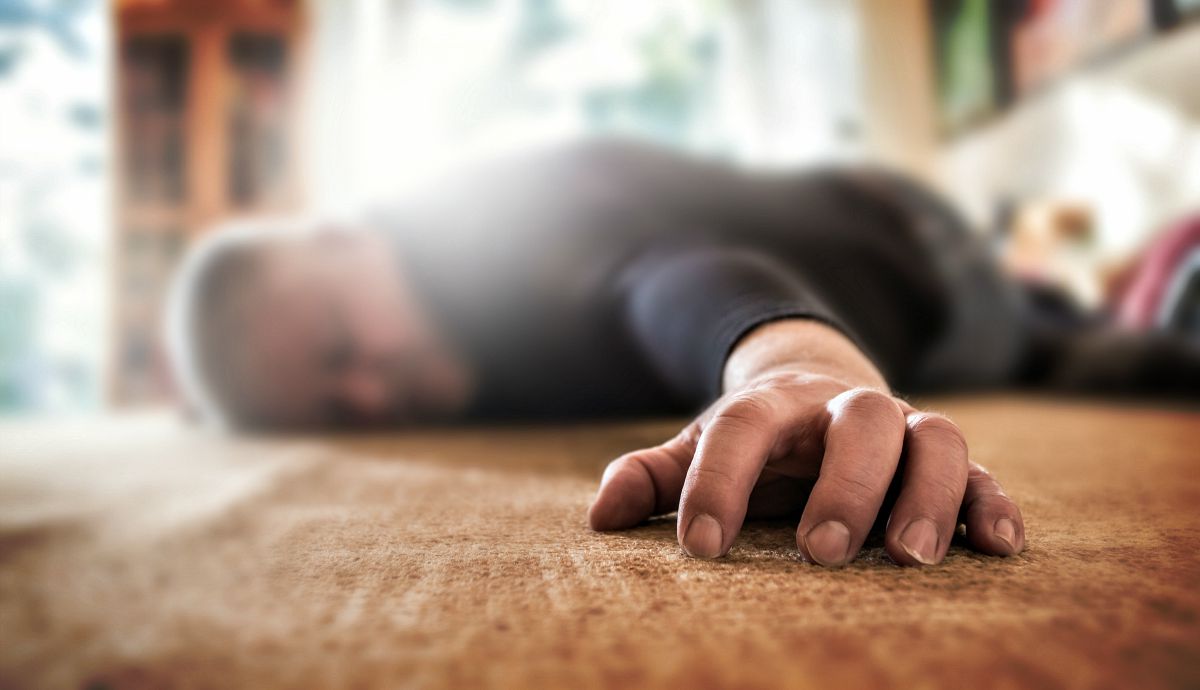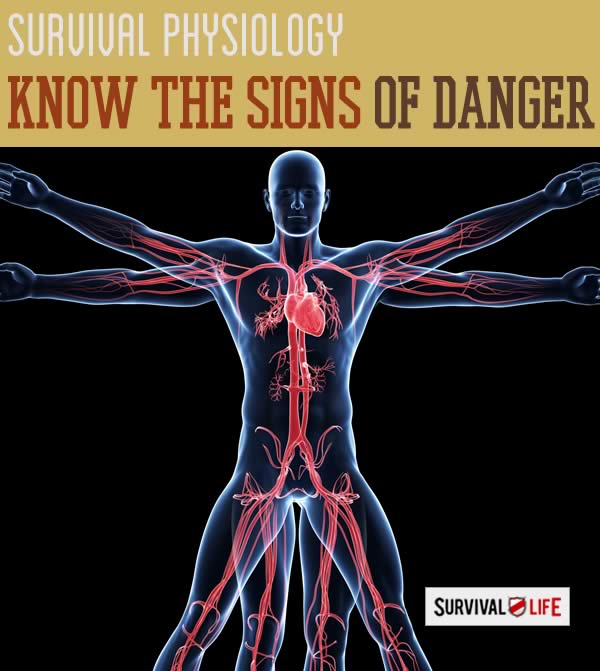The following post Survival Physiology: What You Don’t Know Can Kill You See more on: Total Survival
Understanding your body's natural response to the challenges of survival is a must to keep up and stay alive! Learn as much as you can to increase your odds of survival here.
RELATED: Wise Food Storage For Long-Term Survival
In this article:
- The Importance of Having a Clear Mental State
- Stress
- Exposure to the Elements
- Dehydration
- Starvation
- Loneliness
- What to Remember
Coping with the Risk of Physiological Changes for Survival
The Importance of Having a Clear Mental State
Having all kinds of survival gear is not enough. Most experts would likely agree that the key to enduring in a survival situation is maintaining a positive mental attitude.
A positive attitude ensures you are able to make sound decisions that both mitigate danger and prevent you from taking unnecessary risks.
Physiological changes that occur in your body during a crisis can significantly alter your attitude leading to poor decision making and possibly death. A basic understanding of these physiological changes can help eliminate additional risk.
Stress
Stress is usually the first challenge your body experiences after being in a disaster survival situation. It is a natural reaction to adversity each of us faces.
It is so universal, in fact, that many of us experience it on a daily basis but few people fully understand its impact. Stress is not just mental but physical as well.
Stress is important because it strengthens us and allows us to explore our limitations. Athletes, for example, often stress their bodies to push farther in the competition.
A mathematician may work on ever more complicated problems to sharpen his or her mind. Stress can have a positive impact. On the other hand, stress can be deadly.
When the body experience stress, a cascade of events occurs. One of the first to occur is the acute stress response commonly known as the “fight or flight” response. Your body releases several hormones including dopamine, epinephrine, norepinephrine, and cortisol.
Epinephrine Definition: This is another name for the hormone adrenaline. This hormone is produced by the adrenal glands and is needed to maintain a healthy cardiovascular system.
Cortisol acts to increase blood pressure and blood sugar while suppressing the immune system. Epinephrine provides an initial jolt of energy by acting on the liver to produce glucose.
Additionally, the response can stop digestion and may lead to loss of bladder and bowel control. Other extreme effects can include temporary loss of peripheral vision or “tunnel vision” and loss of hearing.
All of these effects prepare the body for action, but they cannot last for a long period of time. After the acute response ends, the body will experience fatigue and the individual goes numb and weak. This is one point when bad decision making can occur.
Exposure to the Elements
Another challenge you may experience in a survival situation is exposure to the elements. Your skin is your primary barrier against the elements but exposure can weaken it.
Being wet for extended periods softens the skin to the point that it is no longer an effective barrier and can lead to infection and damage such as is seen in “trench foot.”
What is Trench Foot? Trench foot is a foot condition that happens when the feet are immersed in mud or cold water. Blackening of the surface tissue of the feet is seen.
Exposure to the cold causes you to burn more calories to maintain your core body temperature. When your body gets weak because of exposure, the usual first bad decision is you'll take a short rest on the ground.
This decision is often fatal as the ground temperature is rarely the same as human body temperature, leading to a loss of body core temperature in the winter resulting in death by hypothermia or an uncontrolled increase in body temperature in a desert environment.
Finding shelter and staying off the ground is important, as exposure to the elements can kill in minutes.
Dehydration

Thirst and dehydration often occur in survival situations. The key thing to remember is you don’t experience thirst until after the dehydration takes place.
You can avoid this by drinking water before you feel the need. The best place to carry water is not in a canteen or a hydration system but in your own body.
This concept may seem strange but your body is acting as a radiator and water is not effective unless it is in the radiator. When the body overheats, decision-making ability decreases rapidly.
A common misconception is that dehydration only occurs when it is hot. On the contrary, people experience dehydration just as often in cold environments.
Moisture is lost through breathing and urination as well as through sweating. Dehydration leads to decreased blood volume and can lead to higher concentrations of salts within the blood.
Dehydration resulting from profuse sweating has a hidden danger in that your body loses essential electrolytes in the sweat. Rapid rehydration can result in an increase of fluid in and swelling of the brain called osmotic cerebral edema.
If you find yourself severely dehydrated in a survival situation, drink water in sips and slowly rehydrate. The average person can only survive for a few days without water.
RELATED: Dehydration: It’s Even Worse Than You Think
Starvation
Hunger and starvation bring with them their own physiological challenges to the body. Starvation usually occurs after the average person has lost more than 30% of their body weight. Most people can go days and even weeks without food survival supplies before starvation occurs.
During starvation, your body’s primary goal isn’t to keep the body going, it’s to keep the brain alive. Your body is capable of producing several types of sugars to keep the body functioning, but the brain can only use glucose.
Glycogen is a complex molecule stored in the body that can be converted by the liver to glucose. In extreme situations, however, your body can exhaust its glycogen stores in about 24 hours.
Without sufficient calorie intake, your body will burn its fat stores first and then begin to burn muscle tissue. The sugars derived from sources other than glucose and glycogen are not capable of fueling the brain, and prolonged starvation will result in death.
If you do survive starvation, permanent damage to the body may and often does occur.
Loneliness
Unless you already live in a cave far up on a mountain with your favorite volleyball, loneliness can be a killer. Many survivors have reported that boredom, confusion, and depression often result from prolonged loneliness.
Depression associated with loneliness can further complicate a survival situation because a loss of appetite, agitation, and apathy may occur.
It is important to remember in a survival situation that you may be alone where you are but you aren’t alone in this world. Setting daily goals and focusing on small tasks can both help you keep your wits and also help you avoid depression caused by loneliness.
What to Remember
So how does knowing these facts help us survive? First, recognize that stress, both mental and physical, is a natural response to adversity. Learn to manage your stress and keep a positive attitude, and you will have taken a big step forward.
Second, knowing that you may survive for weeks without food, days without water, and sometimes minutes without shelter, can help you prioritize your survival tasks. Make a shelter, build a fire, find water, and then forage for food. Place the most immediate need first.
Lastly, remember that you aren’t alone in the world and that is the reason you are trying to survive.
Facing the unknown is formidable, but having a basic understanding of how your body responds to the different aspects of a survival situation can help you make the decisions that ensure you live to tell the tale.
Know more about dehydration and its symptoms in this video by eHow:
The normal conditions your body is used to living comfortably is very different from the very limited resources in a survival situation. By knowing the challenges you'll face such as stress, shelter, and food, you can also come up with immediate and temporary solutions as you try to survive.
You can even find certain solutions in advance and make these challenges less difficult to face.
Can you cite more solutions in coping with these survival challenges? Share your thoughts with us in the comments section below!
UP NEXT:
- The Limits of the Human Body
- SANITATION: Stay Clean, Stay Healthy, Survive
- PREPAREDNESS: Are You Healthy Enough to Survive?
DISCLAIMER:
This article should not be considered medical advice. Its purpose is to provide a basic overview of the physiological challenges the human body often experiences in a survival situation and is in no way intended to diagnose, treat, or otherwise cure any illness.

Editor’s Note: This post was originally published on February 16, 2015, and has been updated for quality and relevancy.
This Article Was First Found at survivallife.com Read The Original Article HereLearn More Here: Survival Physiology: What You Don’t Know Can Kill You
No comments:
Post a Comment